
If you’re on the hunt for the best non-toxic wood sealers for your garden beds, you’ve got great options!
One fantastic choice is the FDA-approved Garden Box Sealer. This sealer is made from plants and is safe to use around food.
Another great pick is Seal-Once Marine Premium, which is known for being eco-friendly.
You might also like HOPES 100% Pure Tung Oil, which provides excellent moisture protection for your wood.
When choosing a wood sealer, look for ones that will last a long time and are easy to apply.
It’s essential to protect your garden beds without harming the environment.
Keep reading to discover more safe and reliable choices that will help your garden stay strong and healthy!
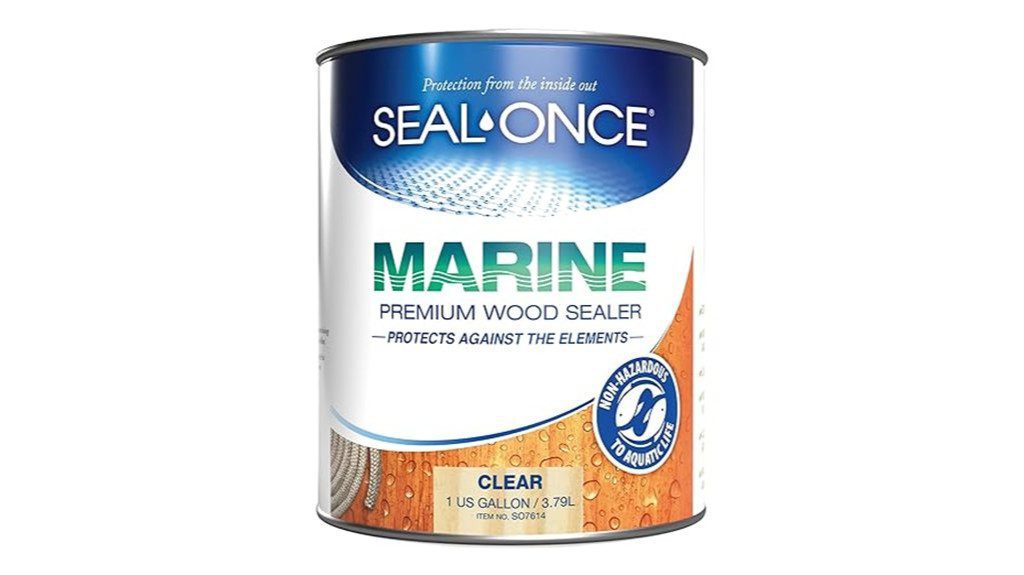
Seal-Once Marine Premium Wood Sealer (1 Gallon) is an excellent choice for eco-conscious gardeners seeking a robust yet non-toxic sealant for their outdoor projects. This waterproof sealant combines a stain and sealer in one, ensuring your garden beds stay protected against elements and water damage. With its ultra-low VOC formula, you can feel confident knowing it’s safe for aquatic life. Application is easy—clean and sand your wood first, then apply in warm conditions. One gallon covers up to 275 square feet, making it an efficient choice. Regular maintenance lends to long-lasting results, so keep your outdoor spaces beautiful!
Best For: Eco-conscious gardeners seeking a non-toxic, waterproof sealant for outdoor projects.
Pros:
Cons:
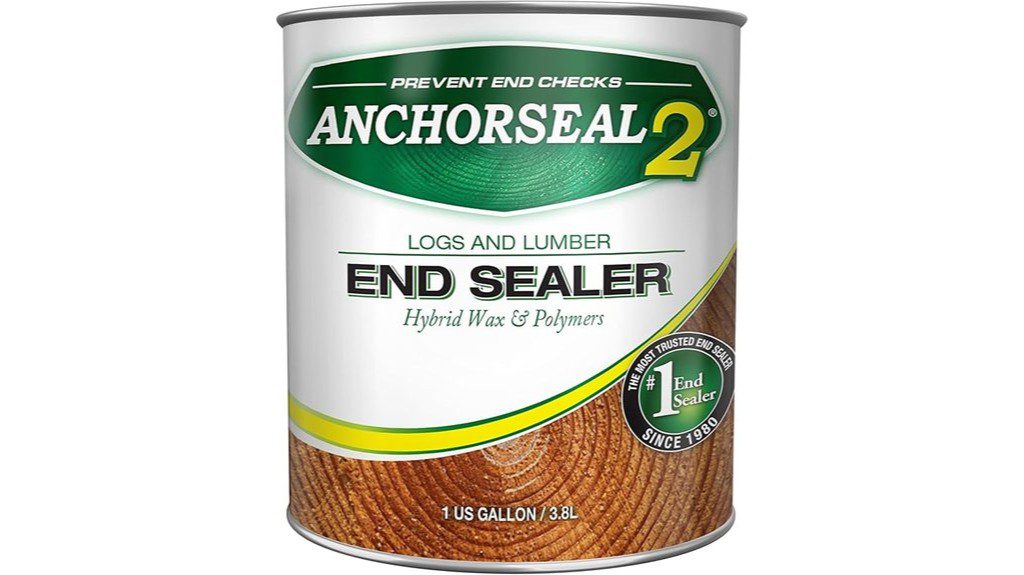
For woodworkers and hobbyists looking to preserve their projects, ANCHORSEAL 2 Log & Lumber End Grain Sealer is an exceptional choice. This sealer prevents up to 90% of drying splits, making it ideal for green wood, turning blanks, and bowls. Many users report cracking incidents below 2% when applied generously. A little goes a long way, often covering hundreds of bowls with just one gallon. Plus, it dries clear, helping you identify wood species easily. With its ability to stabilize moisture loss, ANCHORSEAL 2 guarantees your creations remain intact through seasonal changes, outperforming other sealing methods.
Best For: Woodworkers and hobbyists seeking an effective solution to prevent drying splits in green wood and turning projects.
Pros:
Cons:
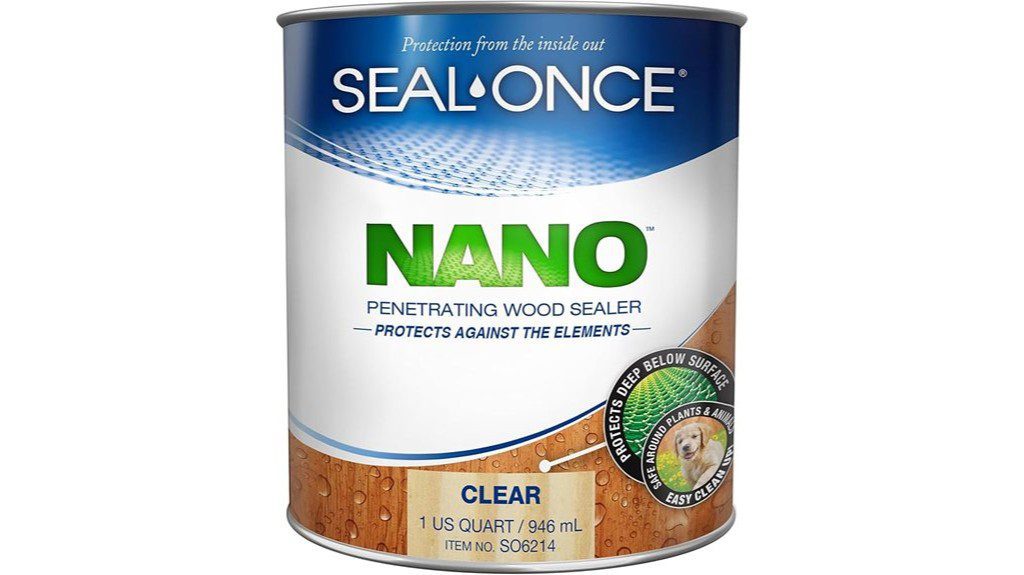
Looking for a reliable solution to protect your garden beds from the elements? The Seal-Once Nano Penetrating Wood Sealer is your go-to choice. This premium waterproof sealant comes in a convenient 1-quart size, offering clear protection without altering the wood’s appearance. Weighing just 2.2 pounds, it’s easy to apply and suitable for various wooden surfaces. Many users praise its ability to repel water, though some report issues with mold and sunlight fading over time. With an average rating of 4.2 stars, it’s a solid option to examine for maintaining the integrity of your garden.
Best For: Those seeking a waterproof sealant to protect wooden surfaces in garden beds without altering the natural appearance of the wood.
Pros:
Cons:
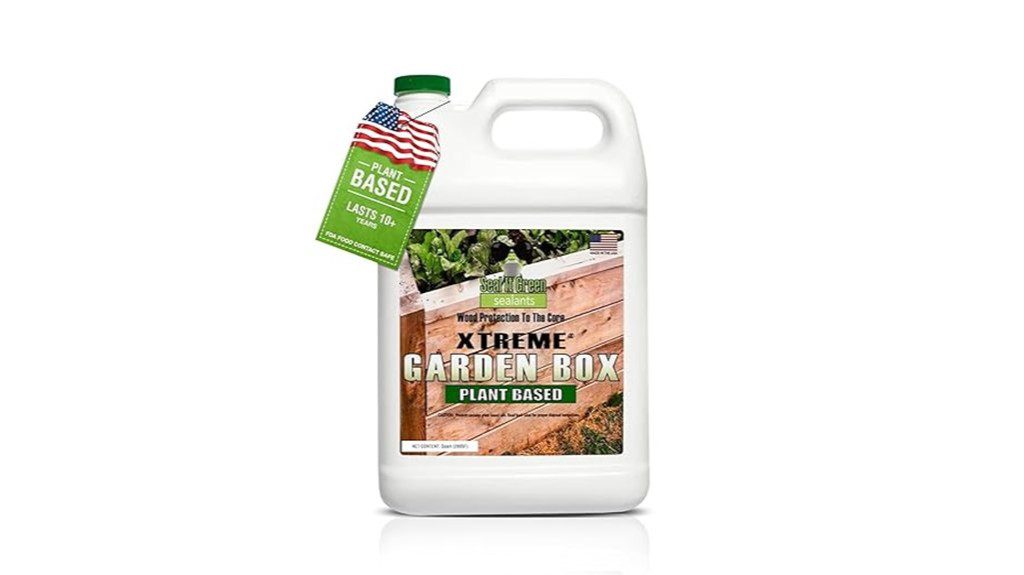
When you want a safe and effective solution for protecting your garden beds, the Garden Box Sealer stands out as an ideal choice. This FDA food contact safe, plant-based wood sealant is perfect for cedar and all wood types, ensuring your raised beds, planters, and even animal houses remain protected. Its natural oils penetrate deeply, offering over a decade of durability. Non-toxic and eco-friendly, it keeps harmful chemicals out of your soil, making it safe for plants, veggies, and pets. Plus, it’s easy to apply, drying quickly with excellent water resistance. Experience enhanced longevity for your green space!
Best For: Home gardeners and pet owners looking for a safe, eco-friendly wood sealant for their garden projects.
Pros:
Cons:
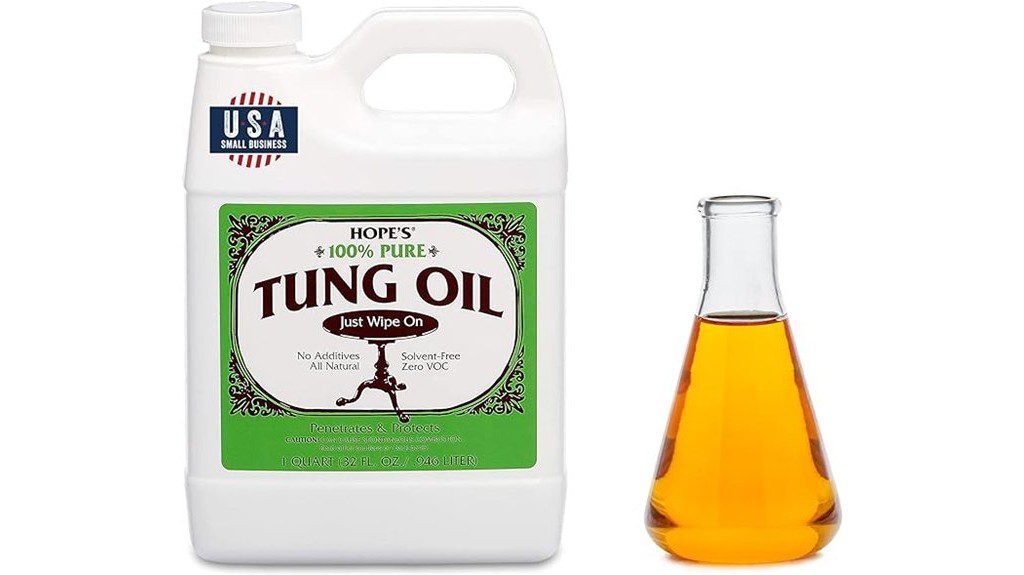
For those seeking a safe and effective way to protect their wood in an organic garden setting, HOPES 100% Pure Tung Oil stands out as an ideal choice. This food-safe wood finish offers a premium waterproof seal that penetrates deeply, forming a flexible, non-oily solid. It’s easy to apply—just rub it on and let it cure for 7-10 days. HOPES is a trusted brand, known for quality and customer satisfaction. You’ll love the rich, even finish it provides, enhancing the natural beauty of wood without altering its characteristics. Just remember to work in a ventilated space for safety!
Best For: Those looking for a food-safe, waterproof wood finish that enhances and protects natural wood surfaces in various settings, including kitchens and organic gardens.
Pros:
Cons:
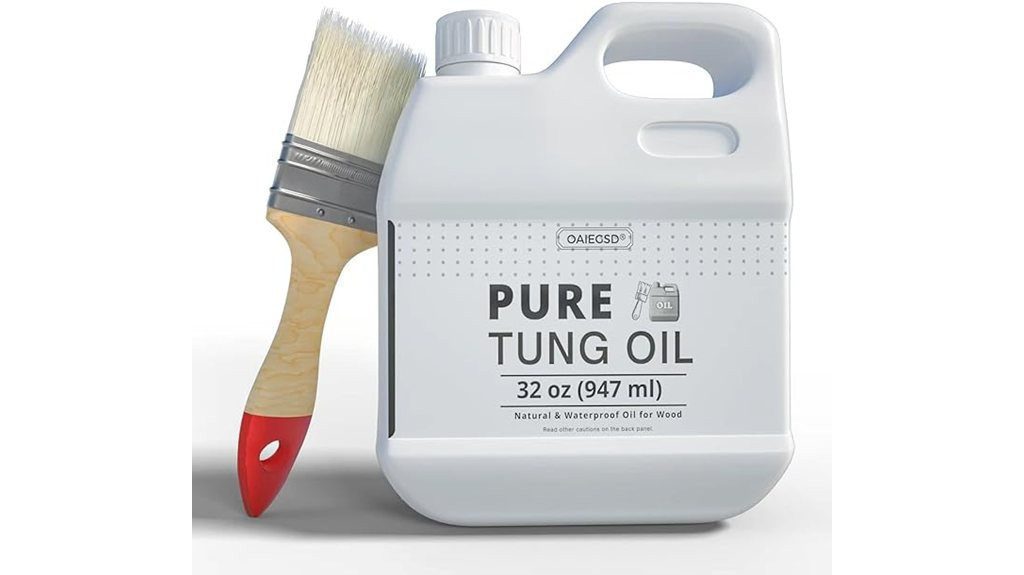
32oz 100% Pure Tung Oil stands out as an ideal choice for eco-conscious gardeners looking to finish their outdoor wooden projects safely. This natural oil, extracted from tung seeds, is free from additives and chemicals, making it food-safe for surfaces like cutting boards. Its waterproofing capabilities guarantee your wood is protected and long-lasting. You’ll appreciate the included specialized brush for application ease. Simply apply it to bare wood, allowing it to penetrate deeply for enhanced luster and durability. With a 4.6-star rating from satisfied users, you can trust this finish will elevate your garden beds beautifully.
Best For: Eco-conscious gardeners seeking a safe and natural wood finish for outdoor projects.
Pros:
Cons:
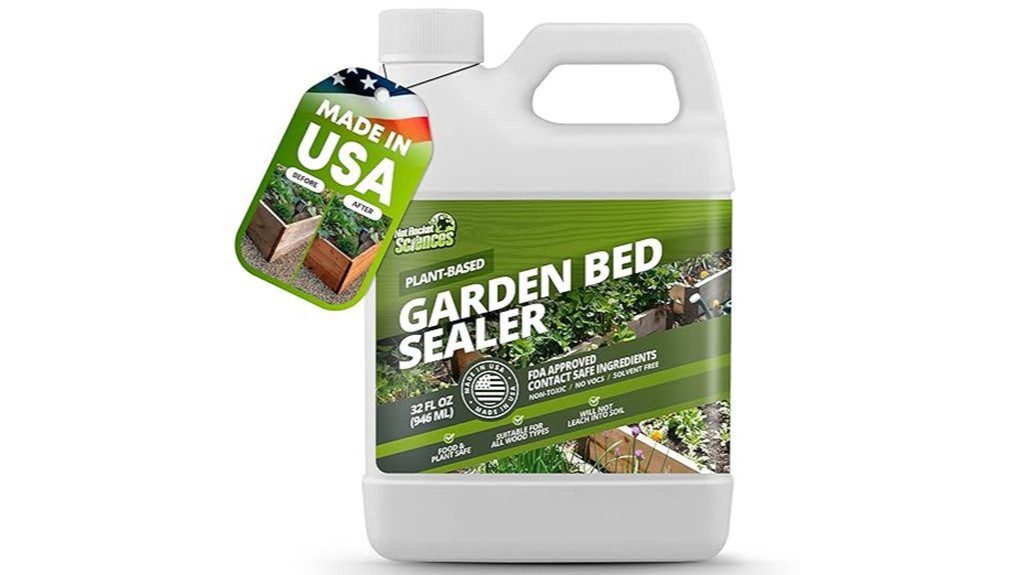
Looking for a reliable way to waterproof your garden beds? The 32oz Garden Box Sealer is an excellent choice. It covers 37.5 to 187.5 sq ft and protects wood against sun, water, and weather damage. Made from 100% non-toxic, plant-based ingredients, it’s FDA food contact-safe for your plants and pets. You can effortlessly apply it with a sprayer, brush, or roller, but make sure to use at least two flood coats on clean, dry surfaces. While some users mention concerns about coverage and odor, many rave about its effectiveness and the beauty it adds to your wood.
Best For: Gardeners and homeowners looking for a non-toxic, effective solution to waterproof and protect their wooden garden beds.
Pros:
Cons:
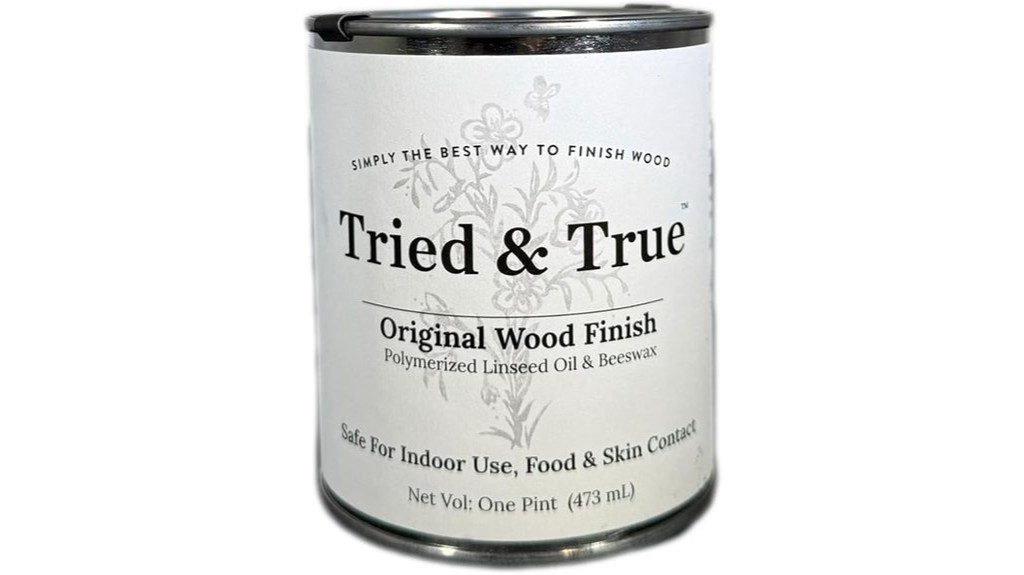
If you’re seeking a safe and effective wood finish for your garden beds or food-related projects, Tried & True Original Wood Finish stands out with its non-toxic linseed oil and beeswax blend. This pint-sized sealer covers up to 125 square feet, providing long-lasting durability while enhancing the wood’s natural beauty. It repels water and liquids, making it ideal for frequent use. Application is simple: sand your wood, apply the finish, and buff it dry. Users rave about its ease of use and low odor, plus it’s food-safe for cutting boards and toys, confirming its versatility in your eco-friendly space.
Best For: Those looking for a non-toxic, food-safe wood finish for home projects, including cutting boards and wooden toys.
Pros:
Cons:
When choosing a non-toxic wood sealer for your garden bed, consider the ingredients to make certain they’re eco-friendly and FDA food safe. You’ll also want to think about how easy it is to apply, as well as the sealer’s weather resistance and long-term durability. Making the right choice will help protect both your plants and the environment.
Choosing a non-toxic wood sealer for your garden bed means prioritizing products with eco-friendly ingredients that won’t harm your plants or the environment. Look for sealers made from plant-based components, as these reduce harmful chemical leaching into soil, promoting healthier plant growth. Ascertain the sealers are free from volatile organic compounds (VOCs) so you don’t expose yourself or the environment to toxic fumes. Biodegradable options are also ideal, as they break down naturally and support healthier ecosystems over time. By opting for non-toxic wood sealers, you protect not just the wood but also surrounding wildlife, pets, and beneficial insects, reducing overall chemical exposure in your green space. Make thoughtful choices for a flourishing garden!
Ensuring your garden is safe for both plants and wildlife starts with selecting an FDA Food Safe wood sealer. These sealers prevent harmful chemicals from leaching into the soil or plants, making them ideal for your garden beds. By using non-toxic, plant-based ingredients, FDA compliant sealers help protect the health of your plants, vegetables, and the surrounding ecosystem. When choosing a product, look for those tested by growers, ensuring they meet strict soil safety standards. This is especially important if your garden houses pets or wildlife, as it safeguards their well-being. A food-safe designation guarantees that the sealer is suitable for surfaces coming into direct contact with edible plants, allowing you to garden with peace of mind.
Selecting a non-toxic wood sealer isn’t just about safety. You’ll want a product that’s easy to apply, whether you’re using a brush, roller, or sprayer. This simplifies the process and saves you time. Look for quick-drying formulations that let you apply multiple coats efficiently, enhancing protection without much hassle. Ideally, opt for sealers that only need 1-2 coats for proper coverage; this makes your work less labor-intensive. Choose options that won’t feel sticky after wiping down, ensuring a smooth finish and reducing errors during application. Finally, consider sealers that cover a significant area, around 200 square feet or more per gallon, so you can tackle larger garden bed projects without constantly buying more product.
While protecting your garden beds from the elements, consider the significance of weather resistance in a non-toxic wood sealer. This feature is essential, as it shields your wood from rain, sun exposure, and temperature fluctuations that can lead to deterioration. An effective sealer forms a waterproof barrier, preventing water damage and swelling, which helps maintain the integrity of your garden beds. Additionally, look for UV protection to combat fading and degradation caused by prolonged sunlight exposure. A durable sealer minimizes moisture absorption, reducing the risk of warping or cracking with humidity changes. Remember, regular maintenance and reapplication are key to ensuring ongoing weather resistance and extending the life of your garden beds.
When protecting your garden beds, long-term durability in a non-toxic wood sealer is key. Look for products that promise over a decade of weather resistance, as these tend to penetrate wood fibers deeply. This deep bond helps resist water damage and environmental degradation, extending the sealer’s lifespan. Keep in mind that your experience may vary based on surface preparation and application conditions—getting this right is essential. Regular maintenance and reapplication, as per manufacturer guidelines, can also prolong the sealer’s effectiveness, typically every few years depending on exposure. Additionally, choose a formulation that includes UV protection to prevent deterioration from sunlight. With careful selection and upkeep, your garden beds will thrive for years to come.
It usually takes about one to three hours for wood sealers to dry, depending on the product, humidity, and temperature. You should check the application instructions to verify ideal results for your project.
You shouldn’t apply wood sealers in cold weather since low temperatures can affect drying and curing times. It’s best to wait for warmer conditions to guarantee proper adhesion and longevity of the sealant.
When choosing non-toxic wood sealers, you’ll want to check the ingredient list for potential allergens. Although labeled as non-toxic, some may contain compounds that could trigger sensitivities, so inspect each product carefully before use.
You should reapply sealers to your garden beds every one to two years, depending on weather exposure and wear. Regular inspections can help determine when it’s time to refresh the protective layer effectively.
Yes, some wood sealers can have a slight odor after application, but it’s usually minimal and dissipates quickly. You’ll want to ventilate the area during and after application to guarantee fresh air circulation.
Choosing the right non-toxic wood sealer for your garden beds is essential for maintaining a safe and eco-friendly environment. The options listed above offer quality protection while ensuring that harmful chemicals aren’t leaching into your soil. Remember to take into account factors like safety for food contact and water resistance. By selecting one of these great sealers, you’re not just protecting your wood, but also contributing to a healthier garden and a greener planet. Happy gardening!
